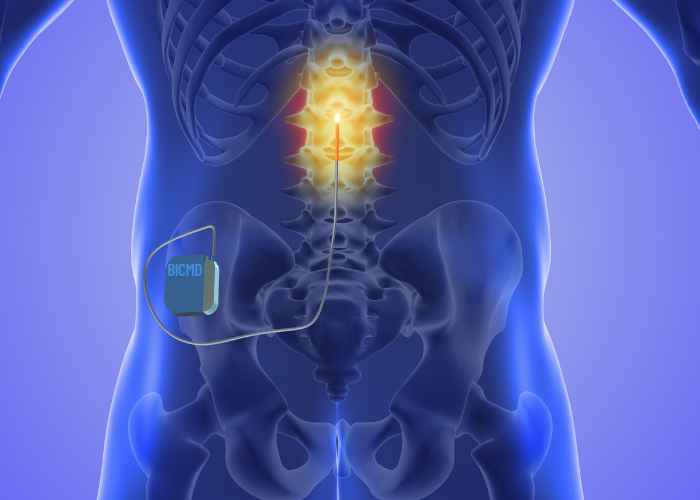What is a spinal cord stimulator?
A spinal cord stimulator (SCS) is a medical device, implanted in the spine (in the epidural space) and is used to manage chronic pain by. AN SCS works by sending mild electrical impulses to the spinal cord which interrupt pain signals before they reach the brain, providing relief for a number of painful back conditions. Spinal cord stimulators are a minimally invasive treatment option for patients who have not found success with medications or other therapies.
Spinal Cord Stimulators and Workers' Compensation:
Spinal cord stimulators are becoming increasingly common in workers' compensation cases as a treatment for chronic pain. Patients who have long-standing back or nerve pain that has not responded to conservative treatments may benefit from having a SCS or spinal cord stimulator. As employers and insurers seek alternatives to long-term opioid use and repeated surgeries, spinal cord stimulation may offer a cost-effective, evidence-based option. At BICMD, we've seen a growing trend in the use of SCS devices for chronic pain management within the workers' comp system. The question insurers and employers should be asking is: Are spinal cord stimulators always the best choice for pain management?
Should we get a second opinion or an objective review before authorizing a spinal cord stimulator?
Spinal cord stimulators are a great choice for alleviating back pain WHEN they are appropriate. An objective medical review done by one of BICMD's Orthopedic Spine Specialists, before authorizing a spinal cord stimulator, is critical to ensuring the procedure is truly necessary and likely to benefit the injured worker. In workers' compensation claims, an objective review helps confirm accurate diagnosis, rule out less invasive options, and avoid costly or ineffective treatments. BICMD can help you understand the clinical validation that supports appropriate use of spinal cord stimulators. We have a proven track-record of improving outcomes and increasing adherence to value based care. For optimal chronic pain management, BICMD's evidence-based review process is essential before proceeding with spinal cord stimulator implantation.
When are spinal cord stimulators warranted in workers' compensation claims?
Through our extensive research and practice at BICMD, we have found that spinal cord stimulators (SCS) may have a limited role in certain workers' compensation claims when chronic pain persists despite conservative treatments. Providers may recommend an SCS for the following conditions:
- Failed Back Surgery Syndrome (FBSS)
- Complex Regional Pain Syndrome (CPRS)
- Chronic Radiculopathy
- Peripheral Neuropathy
- Refractory Low Back or Leg Pain
When is a review needed before authorizing a spinal cord stimulator?
There are a number of clinical red flags which should trigger a review before a spinal cord stimulator is approved. These red flags indicate when further review is necessary to determine medical necessity. Review triggers include:
- Request of SCS implantation without clear documentation of failed conservative treatments.
- No record of psychological evaluation or evidence of untreated mental health conditions
- Multiple prior surgeries, injections or other interventions, without proof of functional improvement
- Unclear diagnosis or a pain pattern that is not consistent with neuropathic pain
- Ongoing opioid dependency without effort to decrease or cease
What should a proper spinal cord stimulator necessity review include?
A proper medical necessity review for a spinal cord stimulator should include a thorough evaluation of the patient's full treatment timeline. The effectiveness of conservative care such as physical therapy, medications, and injections should be reviewed. A good review must also assess psychological screening results and outcomes from any trial stimulation to confirm potential benefit. At BICMD, our reviewers can ensure adherence to evidence-based guidelines like ODG and ACOEM, and we can carefully evaluate patient selection criteria, weighing the potential risks and benefits. Our comprehensive, evidence-based approach is essential to support appropriate use of spinal cord stimulators in workers' compensation cases.
How does a BICMD SCS review help add value to workers' comp claims?
BICMD provides expert spinal cord stimulator (SCS) reviews which add significant value to workers' compensation claims by ensuring treatments are medically necessary and appropriately timed. Our top-tier specialists help prevent unnecessary or premature SCS implantation, which reduces risk and unnecessary spend. Each of our expert reviews supports clinically sound claim decisions which help minimize the potential for dispute. In complex or high-cost cases, BICMD delivers clinical clarity and expert insight, guiding adjusters and payers toward the best care pathway. With our evidence-based approach, we help improve claimant outcomes while promoting smarter, more sustainable claims management.
What review support do you get with BICMD to approve or deny a spinal cord stimulator?
Best In Class MD (BICMD) supports spinal cord stimulator (SCS) reviews with a rigorous, evidence-based process led by board-certified pain management and spine experts. Each case is reviewed by a top-tier specialist who evaluates clinical documentation, treatment history, and adherence to medical guidelines. Insurance carriers receive a clear, comprehensive summary that includes medical rationale and expert recommendations grounded in evidence-based standards.
Do you need an independent medical review for a spinal cord stimulator?
By choosing Best In Class MD (BICMD) reviews for workers' compensation claims involving spinal cord stimulator (SCS) you are ensured a medically sound, unbiased evaluation. In complex or uncertain cases, our expert medical opinions help protect both the claimant's well-being and the integrity of the claim. With guidance from BICMD's board-certified specialists, payers can reduce risk, avoid unnecessary treatment, and support better outcomes. When accuracy and accountability matter, trust BICMD. Contact Best In Class MD today to streamline your SCS reviews and optimize claim performance.



